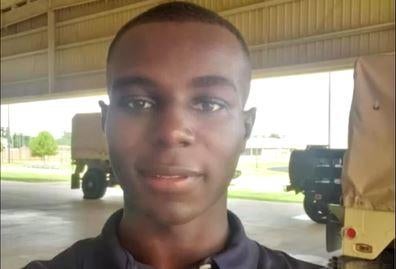Seoul, South Korea — The deputy commander of the U.N. Command said Monday it has started conversations with North Korea over an American soldier who ran into the North last week across the Koreas’ heavily armed border.
Gen. Andrew Harrison said the process has started through communications lines set up at the Joint Security Area between the Koreas under the armistice agreement that stopped the fighting of the 1950-53 Korean War. He said the well-being of Pvt. Travis King remains the command’s primary concern but refused to provide more details, citing the sensitivity of the discussions.
North Korea has remained publicly silent about King, who crossed the border last Tuesday while he was supposed to be heading to Fort Bliss, Texas.
U.S. officials have expressed concern about his well-being and said previously that North Korea was ignoring their requests for information about him.
Reuters
Harrison said he “remains optimistic” but said there was no way to know how the conversation with North Korea would proceed. Civilian tours to the Joint Security Area have been suspended since King’s dash across the border.
CBS News correspondent Elizabeth Palmer says King’s defection “may come as unwelcome news to Kim Jong Un’s regime.”
Palmer points out that Thae Yong-ho, a former North Korean diplomat who defected some years ago to South Korea, wrote on Facebook that, “U.S. soldiers who have crossed/defected to North Korea are inevitably a nuisance because the cost-effectiveness is low in the long run” in terms of propaganda and leverage for Pyongyang over Washington and Seoul.
King’s crossing came at a time of high tensions in the Korean Peninsula, where the pace of both North Korea’s weapons demonstrations and the United States’ combined military exercises have intensified in a tit-for-tat cycle.
Harrison’s comments came hours after South Korea’s military said a nuclear-propelled U.S. submarine arrived at a port on Jeju Island in the second deployment of a major U.S. naval asset to the Korean Peninsula this month. The arrival of the USS Annapolis adds to the allies’ show of force to counter North Korean nuclear threats.
Last week, the USS Kentucky became the first U.S. nuclear-armed submarine to come to South Korea since the 1980s. North Korea reacted to its arrival in Busan by test-firing ballistic and cruise missiles in apparent demonstrations that it could make nuclear strikes against South Korea and deployed U.S. naval vessels.
In between those launches, North Korea’s defense minister issued a veiled threat insisting the Kentucky’s docking in South Korea could be grounds for the North to use a nuclear weapon against it. North Korea has used similar rhetoric before, but the statement underscored how much relations are strained now.
Analysts say North Korea may wait weeks or even months to provide meaningful information about King to maximize leverage and add urgency to U.S. efforts to secure his release. Some say North Korea may try to wrest concessions from Washington, such as tying his release to the United States cutting back its military activities with South Korea.
The United States and South Korea have been expanding their combined military exercises and increasing regional deployments of U.S. strategic assets like bombers, aircraft carriers and submarines in a show of force against North Korea, which has test-fired around 100 missiles since the start of 2022.
The Annapolis, whose main mission is destroying enemy ships and submarines, is powered by a nuclear reactor but is armed with conventional weapons. The Annapolis mainly docked at Jeju to load supplies, but Jang Do Young, a spokesperson of South Korea’s navy, said the U.S. and South Korean militaries were discussing whether to arrange training involving the vessel.
Stay connected with us on social media platform for instant update click here to join our Twitter, & Facebook
We are now on Telegram. Click here to join our channel (@TechiUpdate) and stay updated with the latest Technology headlines.
For all the latest Education News Click Here

